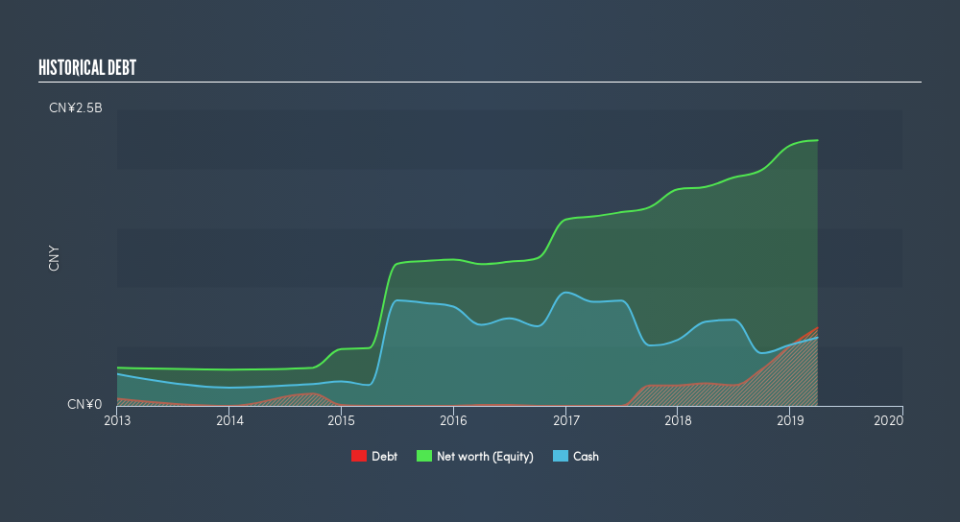Is Baozun (NASDAQ:BZUN) A Risky Investment?

Some say volatility, rather than debt, is the best way to think about risk as an investor, but Warren Buffett famously said that 'Volatility is far from synonymous with risk.' It's only natural to consider a company's balance sheet when you examine how risky it is, since debt is often involved when a business collapses. We can see that Baozun Inc. (NASDAQ:BZUN) does use debt in its business. But the more important question is: how much risk is that debt creating?
Why Does Debt Bring Risk?
Generally speaking, debt only becomes a real problem when a company can't easily pay it off, either by raising capital or with its own cash flow. If things get really bad, the lenders can take control of the business. However, a more usual (but still expensive) situation is where a company must dilute shareholders at a cheap share price simply to get debt under control. Of course, plenty of companies use debt to fund growth, without any negative consequences. When we examine debt levels, we first consider both cash and debt levels, together.
Check out our latest analysis for Baozun
What Is Baozun's Net Debt?
As you can see below, at the end of March 2019, Baozun had CN¥659.1m of debt, up from CN¥190.8m a year ago. Click the image for more detail. However, it also had CN¥576.7m in cash, and so its net debt is CN¥82.4m.
How Healthy Is Baozun's Balance Sheet?
We can see from the most recent balance sheet that Baozun had liabilities of CN¥1.71b falling due within a year, and liabilities of CN¥337.2m due beyond that. Offsetting this, it had CN¥576.7m in cash and CN¥1.39b in receivables that were due within 12 months. So it has liabilities totalling CN¥78.2m more than its cash and near-term receivables, combined.
Having regard to Baozun's size, it seems that its liquid assets are well balanced with its total liabilities. So it's very unlikely that the CN¥17.9b company is short on cash, but still worth keeping an eye on the balance sheet. Carrying virtually no net debt, Baozun has a very light debt load indeed.
We measure a company's debt load relative to its earnings power by looking at its net debt divided by its earnings before interest, tax, depreciation, and amortization (EBITDA) and by calculating how easily its earnings before interest and tax (EBIT) cover its interest expense (interest cover). This way, we consider both the absolute quantum of the debt, as well as the interest rates paid on it.
Baozun has a low net debt to EBITDA ratio of only 0.18. And its EBIT covers its interest expense a whopping 41.8 times over. So we're pretty relaxed about its super-conservative use of debt. In addition to that, we're happy to report that Baozun has boosted its EBIT by 39%, thus reducing the spectre of future debt repayments. There's no doubt that we learn most about debt from the balance sheet. But ultimately the future profitability of the business will decide if Baozun can strengthen its balance sheet over time. So if you're focused on the future you can check out this free report showing analyst profit forecasts.
Finally, while the tax-man may adore accounting profits, lenders only accept cold hard cash. So it's worth checking how much of that EBIT is backed by free cash flow. During the last three years, Baozun burned a lot of cash. While that may be a result of expenditure for growth, it does make the debt far more risky.
Our View
Baozun's interest cover suggests it can handle its debt as easily as Cristiano Ronaldo could score a goal against an under 14's goalkeeper. But we must concede we find its conversion of EBIT to free cash flow has the opposite effect. Looking at all the aforementioned factors together, it strikes us that Baozun can handle its debt fairly comfortably. On the plus side, this leverage can boost shareholder returns, but the potential downside is more risk of loss, so it's worth monitoring the balance sheet. Above most other metrics, we think its important to track how fast earnings per share is growing, if at all. If you've also come to that realization, you're in luck, because today you can view this interactive graph of Baozun's earnings per share history for free.
Of course, if you're the type of investor who prefers buying stocks without the burden of debt, then don't hesitate to discover our exclusive list of net cash growth stocks, today.
We aim to bring you long-term focused research analysis driven by fundamental data. Note that our analysis may not factor in the latest price-sensitive company announcements or qualitative material.
If you spot an error that warrants correction, please contact the editor at editorial-team@simplywallst.com. This article by Simply Wall St is general in nature. It does not constitute a recommendation to buy or sell any stock, and does not take account of your objectives, or your financial situation. Simply Wall St has no position in the stocks mentioned. Thank you for reading.

 Yahoo Finance
Yahoo Finance 
